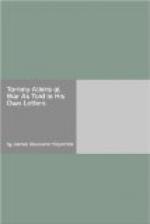Little touches of pathos are not wanting in the scenes pictured in the soldiers’ letters, and they bring an element of humanity into the cold, well-ordered, practical business of war. Men who will meet any personal danger without flinching often find the mists floating across their eyes when a comrade is struck down at their side. Private Plant, Manchester Regiment, tells how his pal was eating a bit of bread and cheese when he was knocked over: “Poor chap, he just managed to ask me to tell his missus.” “War is rotten when you see your best pal curl up at your feet,” comments another. “One of our chaps got hit in the face with a shrapnel bullet,” Private Sidney Smith, First Warwickshires, relates. “‘Hurt, Bill?’ I said to him. ‘Good luck to the old regiment,’ says he. Then he rolled over on his back.” “Partings of this kind are sad enough,” says an Irish Dragoon, “but we’ve just got to sigh and get used to it.”
Their own injuries and sufferings don’t seem to worry them much. The sensation of getting wounded is simply told. One man, shot through the arm, felt “only a bit of a sting, nothing particular. Just like a sharp needle going into me. I thought it was nothing till my rifle dropped out of my hand, and my arm fell. Rotten luck.” That is the feeling of a clean bullet wound. Shrapnel, however, hurts—“hurts pretty badly,” Tommy says. And the lance and the bayonet make ugly gashes. In sensitive men, however, the continuous shell-fire produces effects that are often as serious as wounds. “Some,” says Mr. Geoffrey Young, the Daily News and Leader correspondent, “suffer from a curious aphasia, some get dazed and speechless, some deafened”; but of course their recovery is fairly rapid, and the German “Black Marias” soon exhaust their terrors. A man may lose his memory and have but a hazy idea of the day of the week or the hour of the day, but Tommy still keeps his nerve, and after his first experience of the enemy’s fire, to quote his own words, “doesn’t care one d—— about the danger.”
As showing the general feeling of the educated soldier, independent altogether of his nationality, it is worth quoting two other experiences, both Russian. Mr. Stephen Graham in the Times recites the sensations of a young Russian officer. “The feeling under fire at first is unpleasant,” he admits, “but after a while it becomes even exhilarating. One feels an extraordinary freedom in the midst of death.” The following is a quotation from a soldier’s letter sent by Mr. H. Williams, the Daily Chronicle correspondent at Petrograd: “One talks of hell fire on the battlefield, but I assure you it makes no more impression on me now than the tooting of motors. Habit is everything, especially in war, where all the logic and psychology of one’s actions are the exact reverse of a civilian’s.... The whole sensation of fear is atrophied. We don’t care a farthing for our lives.... We don’t think of danger. In this new frame of mind we simply go and do the perfectly normal, natural things that you call heroism.”




